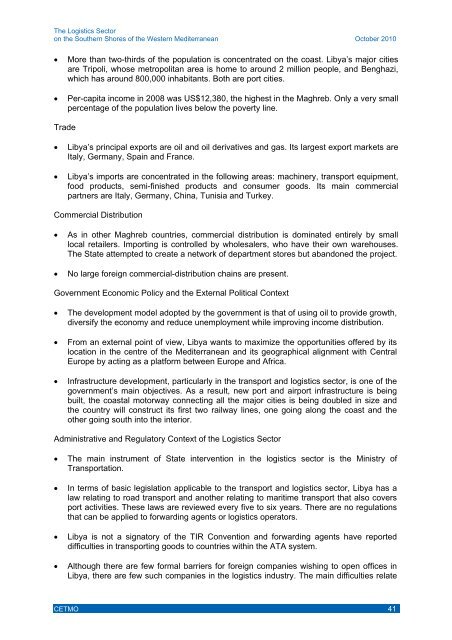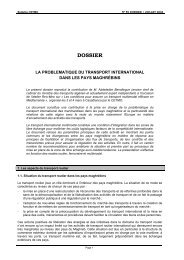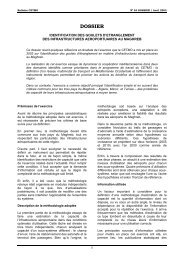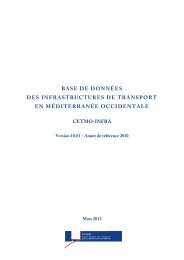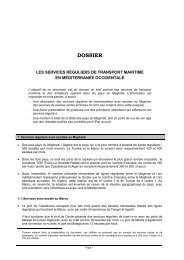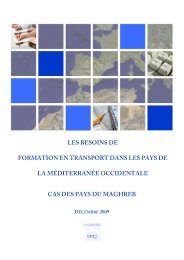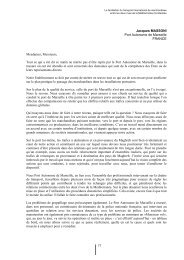The Logistics Sector on the Southern Shores of the Western ... - cetmo
The Logistics Sector on the Southern Shores of the Western ... - cetmo
The Logistics Sector on the Southern Shores of the Western ... - cetmo
- No tags were found...
Create successful ePaper yourself
Turn your PDF publications into a flip-book with our unique Google optimized e-Paper software.
<str<strong>on</strong>g>The</str<strong>on</strong>g> <str<strong>on</strong>g>Logistics</str<strong>on</strong>g> <str<strong>on</strong>g>Sector</str<strong>on</strong>g><strong>on</strong> <strong>the</strong> Sou<strong>the</strong>rn <strong>Shores</strong> <strong>of</strong> <strong>the</strong> <strong>Western</strong> Mediterranean October 2010• More than two-thirds <strong>of</strong> <strong>the</strong> populati<strong>on</strong> is c<strong>on</strong>centrated <strong>on</strong> <strong>the</strong> coast. Libya’s major citiesare Tripoli, whose metropolitan area is home to around 2 milli<strong>on</strong> people, and Benghazi,which has around 800,000 inhabitants. Both are port cities.• Per-capita income in 2008 was US$12,380, <strong>the</strong> highest in <strong>the</strong> Maghreb. Only a very smallpercentage <strong>of</strong> <strong>the</strong> populati<strong>on</strong> lives below <strong>the</strong> poverty line.Trade• Libya’s principal exports are oil and oil derivatives and gas. Its largest export markets areItaly, Germany, Spain and France.• Libya’s imports are c<strong>on</strong>centrated in <strong>the</strong> following areas: machinery, transport equipment,food products, semi-finished products and c<strong>on</strong>sumer goods. Its main commercialpartners are Italy, Germany, China, Tunisia and Turkey.Commercial Distributi<strong>on</strong>• As in o<strong>the</strong>r Maghreb countries, commercial distributi<strong>on</strong> is dominated entirely by smalllocal retailers. Importing is c<strong>on</strong>trolled by wholesalers, who have <strong>the</strong>ir own warehouses.<str<strong>on</strong>g>The</str<strong>on</strong>g> State attempted to create a network <strong>of</strong> department stores but aband<strong>on</strong>ed <strong>the</strong> project.• No large foreign commercial-distributi<strong>on</strong> chains are present.Government Ec<strong>on</strong>omic Policy and <strong>the</strong> External Political C<strong>on</strong>text• <str<strong>on</strong>g>The</str<strong>on</strong>g> development model adopted by <strong>the</strong> government is that <strong>of</strong> using oil to provide growth,diversify <strong>the</strong> ec<strong>on</strong>omy and reduce unemployment while improving income distributi<strong>on</strong>.• From an external point <strong>of</strong> view, Libya wants to maximize <strong>the</strong> opportunities <strong>of</strong>fered by itslocati<strong>on</strong> in <strong>the</strong> centre <strong>of</strong> <strong>the</strong> Mediterranean and its geographical alignment with CentralEurope by acting as a platform between Europe and Africa.• Infrastructure development, particularly in <strong>the</strong> transport and logistics sector, is <strong>on</strong>e <strong>of</strong> <strong>the</strong>government’s main objectives. As a result, new port and airport infrastructure is beingbuilt, <strong>the</strong> coastal motorway c<strong>on</strong>necting all <strong>the</strong> major cities is being doubled in size and<strong>the</strong> country will c<strong>on</strong>struct its first two railway lines, <strong>on</strong>e going al<strong>on</strong>g <strong>the</strong> coast and <strong>the</strong>o<strong>the</strong>r going south into <strong>the</strong> interior.Administrative and Regulatory C<strong>on</strong>text <strong>of</strong> <strong>the</strong> <str<strong>on</strong>g>Logistics</str<strong>on</strong>g> <str<strong>on</strong>g>Sector</str<strong>on</strong>g>• <str<strong>on</strong>g>The</str<strong>on</strong>g> main instrument <strong>of</strong> State interventi<strong>on</strong> in <strong>the</strong> logistics sector is <strong>the</strong> Ministry <strong>of</strong>Transportati<strong>on</strong>.• In terms <strong>of</strong> basic legislati<strong>on</strong> applicable to <strong>the</strong> transport and logistics sector, Libya has alaw relating to road transport and ano<strong>the</strong>r relating to maritime transport that also coversport activities. <str<strong>on</strong>g>The</str<strong>on</strong>g>se laws are reviewed every five to six years. <str<strong>on</strong>g>The</str<strong>on</strong>g>re are no regulati<strong>on</strong>sthat can be applied to forwarding agents or logistics operators.• Libya is not a signatory <strong>of</strong> <strong>the</strong> TIR C<strong>on</strong>venti<strong>on</strong> and forwarding agents have reporteddifficulties in transporting goods to countries within <strong>the</strong> ATA system.• Although <strong>the</strong>re are few formal barriers for foreign companies wishing to open <strong>of</strong>fices inLibya, <strong>the</strong>re are few such companies in <strong>the</strong> logistics industry. <str<strong>on</strong>g>The</str<strong>on</strong>g> main difficulties relateCETMO 41


